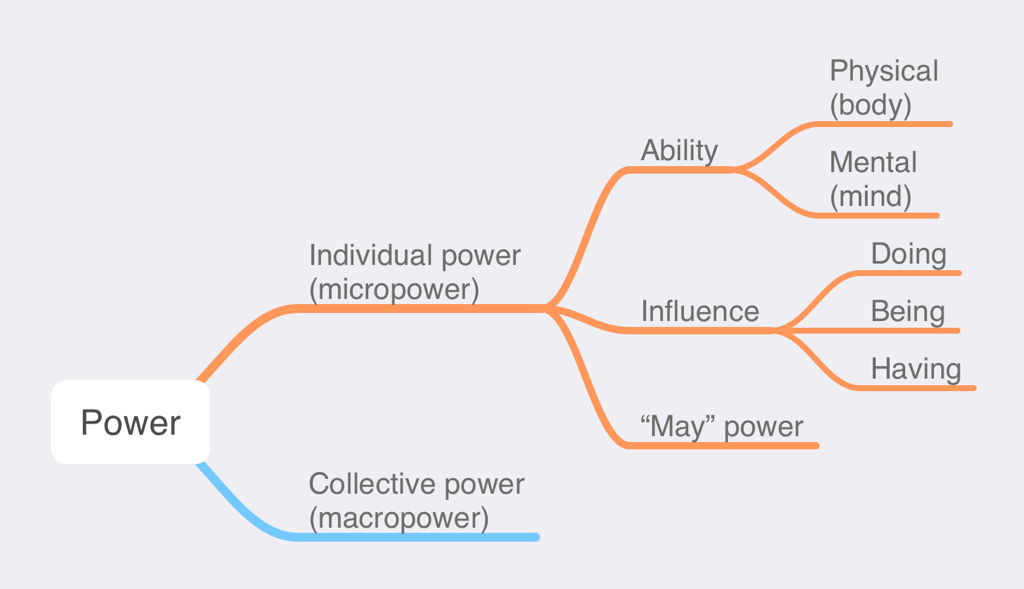- About
- Introduction
-
Browse the book
-
All the pages alphabetically
>
- A >
- B >
- C >
- D >
- E >
- F >
- G >
- H >
- I >
- L >
-
M
>
- Main theories of power
- Making an effort is a prerequisite of using power
- Marxism and the meaning of power
- "May" power
- Meanings of power that are not directly related to social power
- Micropower: Individual power
- Mindfulness
- Media and Digital Literacy as Forms of Individual Power
- (Mis)understanding of power in media texts
- Money and Power
- My synesthetic perception of "power"
- N >
- P >
- R >
- S >
- T >
- U >
- V >
- W >
- Completed pages
-
All the pages alphabetically
>
- Author
Micropower: Individual Power
*completed pages might be rewritten over time
In order to understand power, I propose looking separately at individual power, which I call micropower, and collective power, which I call macropower.
Individual power is the power that an individual can have an use. Some words that can describe individual power are "capacity", "ability", "impact", "control", and "force". I believe that they can be roughly divided into two groups – ability and influence. Both "ability" and "influence" describe what happens on the level of of specific relationships between individuals. This level is easily grasped by the human mind. We can all agree that people can/cannot do things, and that people influence each other. We can easily image these forms of power. I have power to lift a stone: it is an ability that I have. I have power to make my child leave the house at 7:45 am in order to get to on the school bus: this is an influence I can exert. Micropower is concrete and, therefore, (seems) easy to comprehend.
This may be the reason why current scholarship that concerns power (e.g., critical theory) and non-scholarly conversations about power (e.g., debates that characterize polarization) focus on individual power. Micropower is usually called simply "power," due to what I believe to be a misperception or simplification of power relationships. My theory of micro- and macropower is meant to complicate this view by explaining how micropower coexists with what I call macropower – a concept that describes what happens beyond the level of specific easy-to-grasp relationships between individuals.
Individual power is the power that an individual can have an use. Some words that can describe individual power are "capacity", "ability", "impact", "control", and "force". I believe that they can be roughly divided into two groups – ability and influence. Both "ability" and "influence" describe what happens on the level of of specific relationships between individuals. This level is easily grasped by the human mind. We can all agree that people can/cannot do things, and that people influence each other. We can easily image these forms of power. I have power to lift a stone: it is an ability that I have. I have power to make my child leave the house at 7:45 am in order to get to on the school bus: this is an influence I can exert. Micropower is concrete and, therefore, (seems) easy to comprehend.
This may be the reason why current scholarship that concerns power (e.g., critical theory) and non-scholarly conversations about power (e.g., debates that characterize polarization) focus on individual power. Micropower is usually called simply "power," due to what I believe to be a misperception or simplification of power relationships. My theory of micro- and macropower is meant to complicate this view by explaining how micropower coexists with what I call macropower – a concept that describes what happens beyond the level of specific easy-to-grasp relationships between individuals.
Image credit: Fayette Reynolds M.S.
I distinguish two forms of individual power: power as ability and power as influence. These two aspects do not really exist apart from each other; however, I will discuss them separately (in separate entries) for the purpose of my analysis. We can say that "ability" and "influence" are two different angles one can take when looking at micropower. The first aspect provides the focus on the individual abilities: what he/she/they can do. The second aspect provides the focus on how an individual's actions affect other individuals.
To be more precise, we should talk about abilities and influences in plural. Each individual has many abilities (physical and mental); each individual influences other individuals in numerous ways. A variety of abilities possessed by an individual do not remain constant throughout this individual's life. What a one-month-old can do is different from what a 10-years-old can do and from what at 75-years-old can do (with many other differences in between). By the same token, influences are also in the state of flux, as each person occupies constantly changing social context filled with other people and evolving relationships between them.
On top of that, micropower is also context-specific. Different people have different abilities and influences because of each person's circumstances (social context, experiences, and personal characteristics). The dependence of micropower on the context is what makes power such a popular and controversial topic (one of the most contentions questions being, "Why do some people have more power than others?").
Power is inextricably connected with powerlessness. In terms of micropower, in each specific moment in time each person is simultaneously powerful and powerless. One cannot have all possible abilities at once, so while one has some abilities, he/she/they lacks others. By the same token, a person always influences others (which is a form of power), but this influence is always limited and countered by influences coming from other people (which is a form of powerlessness).
I distinguish two forms of individual power: power as ability and power as influence. These two aspects do not really exist apart from each other; however, I will discuss them separately (in separate entries) for the purpose of my analysis. We can say that "ability" and "influence" are two different angles one can take when looking at micropower. The first aspect provides the focus on the individual abilities: what he/she/they can do. The second aspect provides the focus on how an individual's actions affect other individuals.
To be more precise, we should talk about abilities and influences in plural. Each individual has many abilities (physical and mental); each individual influences other individuals in numerous ways. A variety of abilities possessed by an individual do not remain constant throughout this individual's life. What a one-month-old can do is different from what a 10-years-old can do and from what at 75-years-old can do (with many other differences in between). By the same token, influences are also in the state of flux, as each person occupies constantly changing social context filled with other people and evolving relationships between them.
On top of that, micropower is also context-specific. Different people have different abilities and influences because of each person's circumstances (social context, experiences, and personal characteristics). The dependence of micropower on the context is what makes power such a popular and controversial topic (one of the most contentions questions being, "Why do some people have more power than others?").
Power is inextricably connected with powerlessness. In terms of micropower, in each specific moment in time each person is simultaneously powerful and powerless. One cannot have all possible abilities at once, so while one has some abilities, he/she/they lacks others. By the same token, a person always influences others (which is a form of power), but this influence is always limited and countered by influences coming from other people (which is a form of powerlessness).
If you are interested in getting updates about this project (e.g., when new pages are published), please sign up for the newsletter on my main website.
THIS WEBSITE CONTAINS NO AI-GENERATED CONTENT
- About
- Introduction
-
Browse the book
-
All the pages alphabetically
>
- A >
- B >
- C >
- D >
- E >
- F >
- G >
- H >
- I >
- L >
-
M
>
- Main theories of power
- Making an effort is a prerequisite of using power
- Marxism and the meaning of power
- "May" power
- Meanings of power that are not directly related to social power
- Micropower: Individual power
- Mindfulness
- Media and Digital Literacy as Forms of Individual Power
- (Mis)understanding of power in media texts
- Money and Power
- My synesthetic perception of "power"
- N >
- P >
- R >
- S >
- T >
- U >
- V >
- W >
- Completed pages
-
All the pages alphabetically
>
- Author

